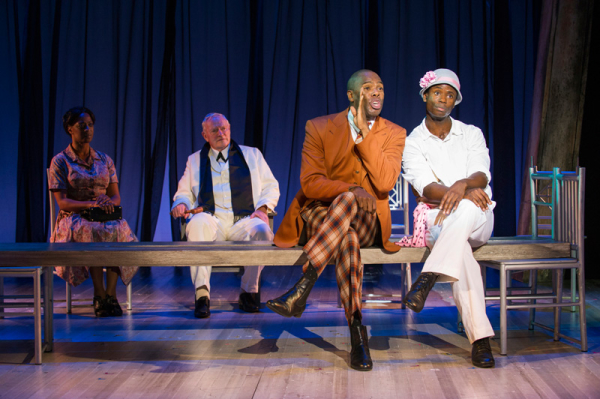How Nigeria Became (Unicorn Theatre)

It's 100 years since Nigeria was ormed under the auspices of the British Empire, uniting reluctant disparate groups in a new nation named not by any of its people, but by the governor's wife.
This centenary has inspired writer and director Gbolahan Obisesan to create How Nigeria Became: A Story, and a Spear that Didn't Work, a drama in which a company of actors are asked to perform the ancient legend of the Spear of Shango as a celebratory entertainment for the governor and his wife. But as they rehearse, it becomes clear to colonial underling Charles that the story they're telling is way off-message. Can he persuade them to twist the traditional tale to reflect their supposed unity and Nigeria's new, co-operative spirit?
Well yes, he can. But this is, inevitably, a very complicated story, not least because it's sandwiched between a Yoruba legend about how the world began, told by the young god Oduduwa, who's played by the engaging Rita Balogun. Her descent from the sky onto designer Rajha Shakiry's beautiful relief-model of earth opens the show promisingly, but thereafter the action takes a long time to get going. Even the excitement of a live chicken on stage is rather dimmed by its reluctance to leave its basket.
Tunji Falana is an entertaining actor with plenty of earthy swagger as Herbert, the leader of the performing troupe. But the early comedy can feel uncomfortable to modern sensibilities, based as it is on the sexual politics of a husband with two warring wives who are battling for his attention. And his predatory interest in Innocence, an eager teenage acolyte, doesn't feel like much to joke about either.
Things pick up once the quest gets underway, with representatives from three tribes battling to find and take control of the magical spear that will secure their future.
But more songs, more dancing and more invitations to join in would make this feel more like a children's show. The young audience love the riddles sequence, shouting out some terrific responses, and it would be nice to see these warm and funny actors engaging more directly with the children sitting at their feet. The fabulous dance at the end of the show makes even more of a buffoon of establishment figure Charles, played by Christian Roe, who gave such a memorable performance in this theatre as the Velveteen Rabbit.
Obisesan's cross-cultural identity has given him a powerful insight into Nigeria's past, but the complications both of the plot and the politics mean there is so much narrative to get through that we don't ever really engage with any of the characters, or care passionately about what happens to them. And sadly that means How Nigeria Became may have a limited appeal.











